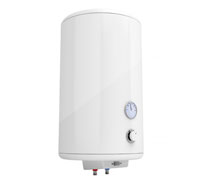Question Topic
Water Heater (Electric) Pressure Relief Valve Leaking

POLICY-Wizard™ calculates your ideal home care program to avoid problems with your Water Heater (electric), but sometimes trouble can still occur. Here are answers to questions about water heater (electric) pressure relief valve leaking.
QUESTION FROM Kat Bannister
I need to purchase an expansion valve for my hot water heater. it is old style and i cannot afford to replace it with one of those new expansion tanks. Can you help me find and expansion valve to replace this with or let me know any way to stop the leak until I can afford a plumber?
ANSWER FROM POLICY-Wizard™
Dear Kat:
If I understand your situation correctly, it sounds like your pressure relief valve on our hot water heater is leaking water out through the discharge tube, right? And if I had to assume, your home has a back flow prevention valve on the water supply to your house, and you do not have an expansion tank on your hot water system, correct?
First to answer your first question, you can purchase a pressure relief valve at most plumbing supply businesses. Here's an example of an online distributor, although we do not have any experience with them: http://www.plumbingworld.com/heatingrelatedproducts.html
But regarding your question of stopping the leak, it is VERY IMPORTANT to note that your water heater's pressure relief valve may be leaking because it is doing its job. That is, that the water pressure in your hot water heater may be too high, and it is venting water to help get the pressure down. An over-pressured water heater can be VERY DANGEROUS, as they have been known to explode.
One question is whether this leaking from your pressure relief valve is because this valve is failing? Or is it because you have a back flow prevention valve on your system, but you do not have an expansion tank . . . and as the water heats and expands, it has no place to go, so it causes your pressure relief valve to open? Or is it because your tank is operating at too high of a pressure?
Here is an online article that describes the operation of water heater pressure relief valves, that you might find helpful:
http://www.factsfacts.com/MyHomeRepair/PressureRelief.htm
Since your pressure relief valve is an important safety feature of your water heater, we have to advise that you should have a trained professional evaluate it as soon as possible.
Probably not what you wanted to hear, but we hope this is helpful for you.
Home-Wizard.com+K5
QUESTION FROM bhleske
How much water should flow out the bottom cold water relief valve in an electric hot water system.we seem to be losing a fair bit more than 8 gallons
ANSWER FROM POLICY-Wizard™
Dear bhleske:
Just a couple of questions so that I can better understand your situation:
1) how do you mean the "bottom cold water relief valve"? Are you referring to a drain valve on the supply side? Or the pressure relief valve (which should actually be on the hot side)?
2) when you say you are "losing more than 8 gallons," over what time period are losing this volume? Or do you mean that this how much comes out when you drain the tank?
If you can let me know on these questions, hopefully I will be able to help you.
Sincerely,
Home-Wizard.com
FOLLOW-UP FROM bhleske
Dear Home-Wizard;
Attached is a photo hopefully to clear things up. The black knob is the non return valve for cold water inlet to tank
Water loss is when heater is heating.
Regards
ANSWER FROM POLICY-Wizard™
Dear bhleske:
Thank you for sending the photo, that was very helpful.
There are two reasons why a pressure relief value could be leaking on your water heater:
1) the valve has either gone bad, or has a particle of sediment from the tank that is keeping it from seating properly; or
2) the pressure in your tank is exceeding the relief point.
Regarding your pressure relief valve, you might want to try lifting the lever in the valve to allow it to discharge (be careful, as the water coming out can be scalding hot) so it can flush out any debris. Alternatively you may have to replace the valve. These valves are usually not very expensive, but they can be hard to remove.
And regarding the pressure in your tank being too high, if you don't already have one, then you may need to have an expansion tank installed. The other cause could be that the line pressure from you main supply may have become too high.
Hope this is helpful.
Home-Wizard.com

 Overview
Overview Routine Care
Routine Care Q & A
Q & A Articles
Articles